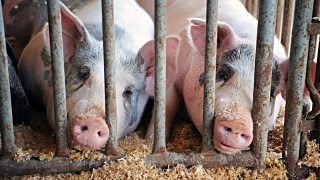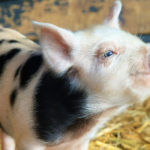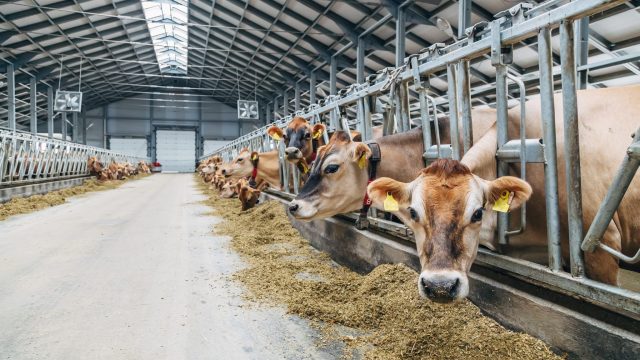
Tofurky Challenges Unconstitutional Texas Label Censorship Law
Lawsuit filed by the Animal Legal Defense Fund and The Good Food Institute asserts that the law imposes unclear and vague standards on plant-based meat producers
Contacts: media@aldf.org
SAN ANTONIO — On August 31, the Animal Legal Defense Fund and The Good Food Institute filed a complaint on behalf of Tofurky challenging a Texas law under the dormant Commerce Clause, the Due Process Clause, the Supremacy Clause, and the First Amendment of the Constitution. The challenged law imposes vague and burdensome disclosure standards on companies producing plant-based and cultivated meats, even when these products clearly comply with federal law. These products are clearly marketed and packaged, do not deceive consumers, and comply with federal regulations under the Food, Drug, and Cosmetic Act — yet they are the target of this protectionist state law, designed more to protect Texas animal producers than Texas consumers. The law went into effect on September 1, 2023.
The lawsuit, filed in the U.S. District Court for the Western District of Texas, argues that the Texas law imposes additional burdensome, impractical, and unclear disclosure requirements on plant-based meat producers that go beyond federal law. Tofurky also argues that there is an added patchwork of state-law labeling requirements — intended to make the sale of plant-based products impracticable on a nationwide basis. What’s more, in order to comply with the law, plant-based meat companies would need to redesign each product label and its corresponding marketing materials, which would prevent them from communicating the nature and contents of their products in a way that complies with federal law, and would cost millions of dollars in packaging changes alone. The Texas law requires an additional disclaimer qualifying that plant-based products are not actually meat in the same (or larger) type size and prominence as any “surrounding type” on products’ front packages.
Federal courts have recognized that the likelihood that consumers might be confused about plant-based naming conventions is “highly improbable” and “stretches the bounds of credulity.” The U.S. Ninth Circuit Court of Appeals analyzed naming conventions similar to Tofurky’s and found it implausible that consumers would “believe that veggie bacon contains pork, that flourless chocolate cake contains flour, or that e-books are made out of paper.”
“Texas is using the same unconstitutional playbook as states such as Arkansas and others in an attempt to tip the balance of the market in favor of animal products while consumers show increasing interest in choosing products that take into account the well-being of animals, the environment, and their own overall health,” says Animal Legal Defense Fund Managing Attorney Amanda Howell. “Consumers who realize that the harms of factory farming — from zoonotic disease to greenhouse gas emissions — should have equal access to food products that align with their values.”
“Texas lawmakers are following what is now, unfortunately, a well-worn playbook that benefits large animal agriculture special interests at the expense of their constituents,” says Tofurky CEO Jaime Athos. “Texas consumers deserve unfettered access to the foods of their choosing, and it is insulting to their intelligence – and contrary to the facts – to suggest that they are being misled into selecting plant-based options. Texans are smart enough to understand that ‘plant-based’ foods are, in fact, made of plants. We hope the courts are likewise smart enough to see through this pretext of ‘confusion’ and hold unconstitutional these lawmakers’ efforts to install regulatory hurdles intended to stifle the growth of the plant-based industry and limit consumer choice.” Athos continues, “It is frankly appalling to see legislators putting their thumbs on the scale to support an animal industry that already benefits from a system heavily tilted in its favor. I have faith that the courts will see that what Texas has passed is just another in a series of unconstitutional, protectionist state laws, and do the right and fair thing by overturning it.”
The Texas law is similar to earlier meat-labeling censorship laws aimed at curtailing the truthful commercial speech of plant-based food companies that have been passed in Arkansas, Louisiana, Missouri, and Oklahoma, among other states. A number of those laws face similar legal challenges from Tofurky and the Animal Legal Defense Fund. In December 2019, these organizations and the American Civil Liberties Union challenged the Arkansas law; the court halted its enforcement and determined that it was an unconstitutional restriction on Tofurky’s right to free speech. The U.S. Fifth Circuit Court of Appeals also determined that Louisiana’s law could only be applied in the far-fetched scenario in which a plant-based meat producer might attempt to intentionally trick consumers into thinking its products came from slaughtered animals — essentially rendering the Louisiana law irrelevant.
Sign Up!
Join the Animal Legal Defense Fund's email list to stay up to date on lawsuits, legislation, and regulations affecting animals.
Focus Area
How We Work
Related
-
City of Sturgeon Agrees to Pay $500,000 in Settlement Over Police Shooting of Blind, Deaf Dog
The lawsuit argued the lethal force used violated the 4th amendmentNovember 14, 2025 Press Release -
California Governor Signs Animal Protection Bills into Law
The Animal Legal Defense Fund sponsored two bills protecting cats and wild animalsOctober 21, 2025 News -
Appeal Filed Over Court Decision Letting EPA Suppress Factory Farm Air Pollution Reporting
The EPA’s rule shields polluters as factory farm emissions kill more people than coal plantsOctober 14, 2025 News




